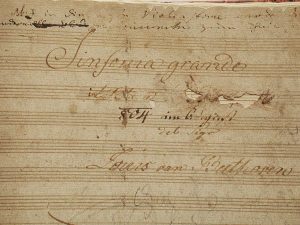Heroic efforts, rewarded
Beethoven was not known for being a polite and gentle man. When he was alive, the European ruling class called all the shots, and musicians were most certainly considered to be of the servant class. So it’s natural that he championed Napoleon‘s revolutions against tyrannical monarchies, so much so that Beethoven decided to dedicate his third symphony to the Frenchman. Well, it was a good idea until Napoleon declared himself emperor, at which point Beethoven angrily ripped off the front page of his symphony and violently rubbed out Bonaparte’s name, leaving a gaping hole in the page.
The fourth movement of the symphony is a set of variations on an original theme Beethoven had written earlier. Putting political and military personages aside, Beethoven is both revolutionary and heroic in this music: Revolutionary because he expressed his unbridled emotions and wrote what he wanted to, practically ushering in the romantic era; Heroic because there are parts in this movement where I believe Beethoven becomes completely lost and doesn’t know what to do next. He doesn’t have Mozart’s grace and complete control over his score; he doesn’t have Bach’s brain for organization, which knew the limits of a piece of music based on the first couple measures. Beethoven has to fight for it – and fight he does, with bravura that you have to admire.


Recent Comments